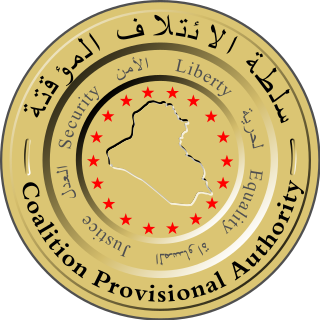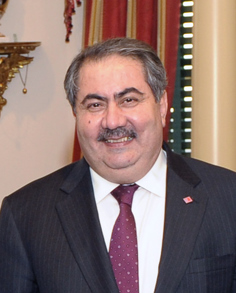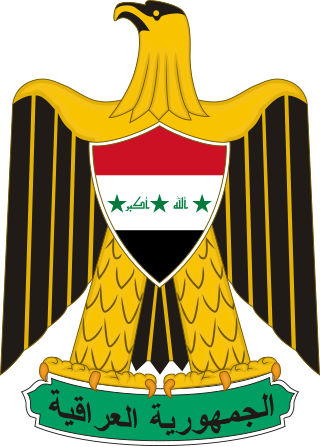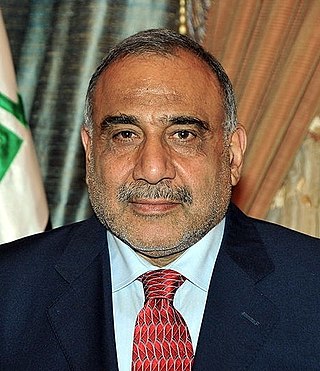Related Research Articles
Iraq is a federal parliamentary representative democratic republic. It is a multi-party system whereby the executive power is exercised by the Prime Minister of the Council of Ministers as the head of government, the President of Iraq as the head of state, and legislative power is vested in the Council of Representatives.

The occupation of Iraq (2003–2011) began on 20 March 2003, when the United States invaded with a military coalition to overthrow Iraqi president Saddam Hussein and his Arab Socialist Ba'ath Party, and continued until 18 December 2011, when the final batch of American troops left the country. While the United States, the United Kingdom, and Australia were the largest contributors to the coalition, 29 other countries, such as Japan, were involved in the Iraq War in a lesser capacity. Additionally, several private military contractors took part in enforcing the occupation.

Ibrahim Abdul Karim al-Eshaiker, better known as Ibrahim al-Jaafari, is an Iraqi politician who was Prime Minister of Iraq in the Iraqi Transitional Government from 2005 to 2006, following the January 2005 election. He served as Minister of Foreign Affairs from 2014 to 2018.

The Iraqi Governing Council (IGC) was the provisional government of Iraq from 13 July 2003 to 1 June 2004. It was established by and served under the United States-led Coalition Provisional Authority (CPA). The IGC consisted of various Iraqi political and tribal leaders who were appointed by the CPA to provide advice and leadership of the country until the June 2004 transfer of sovereignty to the Iraqi Interim Government.
Ala Abdessaheb al-Alwan was Minister of Education in the cabinet appointed by the Interim Iraq Governing Council in September 2003, and Minister of Health in the Iraqi Interim Government.
Mufid Mohammad Jawad al-Jazairi was Minister of Culture in the cabinet appointed by the Interim Iraq Governing Council in September 2003 and in the Iraqi Interim Government. A Shia Muslim and member of the Iraqi Communist Party' central committee, al-Jazairi was a journalist by profession. He worked for the Arabic desk at Czechoslovak Radio in the 1960s and 1970s and married Czech radio journalist Pavla Jazairiová. He returned to Iraq in the 1980s and became a member of the Kurdish opposition. His older son Nisan Al-Jazairi is a merchant, his younger son Martin Jazairi is a reporter for Czech television in Russia.

Hoshyar Mahmud Mohammed Zebari, or simply Hoshyar Zebari is an Iraqi - Kurdish politician who served as Deputy Prime Minister of the country in 2014 and as Minister of Finance until 2016. He was Minister of Foreign Affairs from 2003 to 2014.
Rashad Mandan Omar is an Iraqi politician and engineer who was Minister of Science and Technology in the cabinet appointed by the Interim Iraq Governing Council in September 2003 and in the Iraqi Interim Government. He retained his position in the 2004 interim government.
Kamel Mubdir al-Kilani was Minister of Finance in the cabinet appointed by the Interim Iraq Governing Council in September 2003. A Sunni Muslim and contractor, al-Kilani remained in Iraq during the span of the Saddam Hussein government. He holds a diploma degree in economics and public administration from Mustansiriyah University in Baghdad

The Mahdi Army was an Iraqi Shia militia created by Muqtada al-Sadr in June 2003 and disbanded in 2008.

The Iraqi Interim Government was created by the United States and its coalition allies as a caretaker government to govern Iraq until the drafting of the new constitution following the National Assembly election conducted on January 30, 2005. The Iraqi Interim Government itself took the place of the Coalition Provisional Authority on June 28, 2004, and was replaced by the Iraqi Transitional Government on May 3, 2005.

The Council of Representatives is the de facto unicameral legislature of the Republic of Iraq. According to the Constitution of Iraq, it is the lower house of the bicameral legislature of the country. As of 2020, it comprises 329 seats and meets in Baghdad inside the Green Zone.

Hajim Mahdi Saleh al-Hassani to a prominent family is an Iraqi politician and was the speaker of the Iraqi National Assembly under the Iraqi Transitional Government. A moderate Sunni Arab and relative outsider, having spent much of his life in the United States, al-Hassani was tapped as a compromise candidate for the speaker's post after weeks of deadlock between Iraqi political parties. al-Hassani had previously been a member of the Iraqi Islamic Party in exile and was Industry Minister under the interim government of Iyad Allawi.

Adil Abdul-Mahdi al-Muntafiki is an Iraqi politician who served as Prime Minister of Iraq from October 2018 until May 2020. Abdul-Mahdi is an economist and was one of the vice presidents of Iraq from 2005 to 2011. He formerly served as Minister of Finance in the Interim government and Oil Minister from 2014 to 2016.

Thamir Abbas Ghadhban is an Iraqi civil servant and politician.

Governorate or provincial elections were held in Iraq on 31 January 2009, to replace the local councils in fourteen of the eighteen governorates of Iraq that were elected in the 2005 Iraqi governorate elections. 14,431 candidates, including 3,912 women, contested 440 seats. The candidates came from over 400 parties, 75% of which were newly formed.
This article concerns the formation process of the Al Maliki I Government of Iraq in the aftermath of the Iraq National Assembly being elected on December 15, 2005. Due to disputes over alleged vote-rigging the results of the election were only certified by the Independent Electoral Commission of Iraq on February 10, 2006.

The Abdul Mahdi government was the government of Iraq, headed by Prime Minister Adil Abdul-Mahdi. It was approved by the Council of Representatives on 24 October 2018 and followed a general election in May 2018. The United Nations described the formation as an "exemplary peaceful transfer of power".

Fuad Mohammed Hussein is an Iraqi Kurdish politician from the Kurdistan Democratic Party who is the current Iraqi Minister of Foreign Affairs. He was previously the Minister of Finance in the Government of Adil Abdul-Mahdi.

A series of demonstrations, marches, sit-ins and civil disobedience took place in Iraq from 2019 until 2021. It started on 1 October 2019, a date which was set by civil activists on social media, spreading mainly over the central and southern provinces of Iraq, to protest corruption, high unemployment, political sectarianism, inefficient public services and foreign interventionism. Protests spread quickly, coordinated over social media, to other provinces in Iraq. As the intensity of the demonstrations peaked in late October, protesters' anger focused not only on the desire for a complete overhaul of the Iraqi government but also on driving out Iranian influence, including Iranian-aligned Shia militias. The government, with the help of Iranian-backed militias responded brutally using live bullets, marksmen, hot water, hot pepper gas and tear gas against protesters, leading to many deaths and injuries.
References
- BBC News (2003-09-01). "Iraq's post-war cabinet" . Retrieved 2006-02-24.
- BBC News (2004-06-01). "Interim Iraqi government" . Retrieved 2006-02-24.
- ↑ Iraqi MP withdraws from ِAllawi's INL, now independent, Voices of Iraq, 30 May 2007, accessed on 4 July 2007
- ↑ The departure of Iraqi political and economic Mahdi al - Hafiz